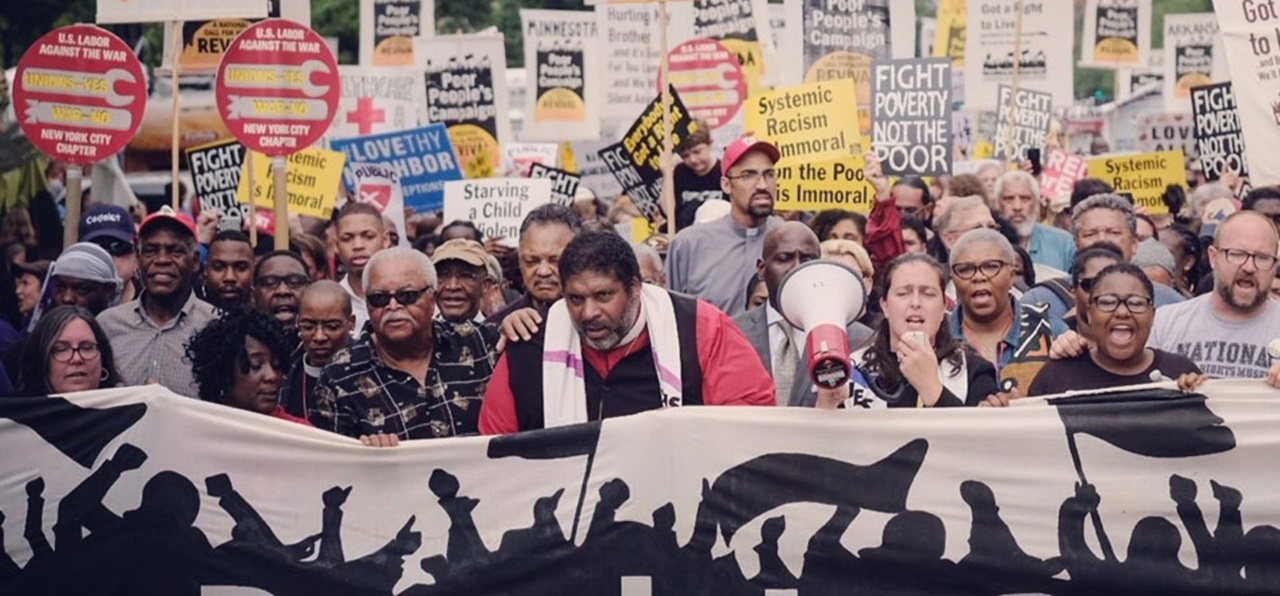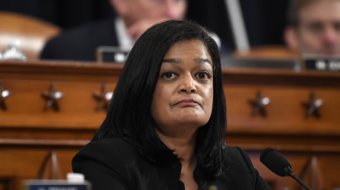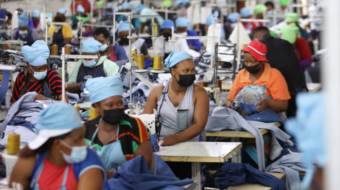
WASHINGTON—To no one’s surprise, the Poor People’s Campaign may have a problem, with politicians.
After descending upon lawmakers here yesterday they are now more determined than ever to turn out poor and low-wealth people to promote their platform—including affordable housing, affordable and universal health care, an end to hunger, and diversion of money from the Pentagon to domestic needs. They are stepping up their campaign because it was clear after their massive lobbying effort here yesterday that lawmakers are not yet ready to make major commitments to them.
It may be a big mistake for lawmakers. If, as leaders of the campaign say, only a fifth of the low-income and poor voters turn out in key swing states, it could mean a huge win for their entire agenda and a total defeat of the entire right-wing MAGA movement led by Trump.
The reluctance of lawmakers on the local level here to get on board with their issues was what a group of D.C. Poor People’s Campaigners found out on February 20 when they came to D.C.’s City Hall to meet Mayor Muriel Bowser (D) and the 13 City Council members in what is supposed to be one of the nation’s progressive bastions.
The campaigners wanted to talk big picture, they told a press conference after the visits: Their concern was the impact of poverty on at least 140 million poor and low-wealth people nationwide, including 30% of D.C.’s 735,000 residents “in the richest city in the richest country on earth,” as one speaker put it.
And they wanted to talk about big-picture solutions, too. Those include higher taxes on the city’s high share of rich people and reallocation of money away from policing to community solutions to crime, more money for schools, and health care availability for all.
Nationally, the Poor People’s Campaign also wants to shift $100 billion from the Pentagon to domestic needs, such as better education, universal health care, food programs, and affordable housing.
And it fights for worker rights, including the right to organize and safety and health on the job—and against workers’ foes, such as white nationalists and right-wing preachers.
“We shared with them that we are the movement that is building the political will to end poverty–the fourth-leading cause of death” in the U.S., and a leading cause of death in D.C., said Ward 2 resident Madison Crum. Poverty kills more people yearly “than homicide, gun violence, overdoses, and diabetes. And that was before the pandemic.
“We are that movement to establish justice and promote the general welfare.”
But post-press conference interviews revealed that with one or two exceptions, the pols gave vague but polite replies, or talked small ball. The big picture? No.
One aide touted a so-called “crime bill” which community groups say would give more power to cops, without accountability. Another said his unnamed councilmember advocates more housing—not necessarily affordable housing, though.
And the aide to Councilmember Robert White, D-At Large, told campaigner George Daniel that “budget deficits mean social service agencies are at each other’s throats” for funds in the fiscal year that begins October 1.
“What do we cut?” White’s aide asked.
Eliminating poverty is the big issue
Instead of eliminating poverty, a root cause of crime, D.C. politicians talk about having prosecutors—not judges—criminalize teens for stealing $500 worth of goods, campaigner Joshua Burris said afterward. And gentrification in Southwest D.C., now undergoing massive redevelopment, is pushing long-time residents out, another campaigner told People’s World.
Crime fears, gentrification, and cuts in social services, thanks to the House Republican congressional majority and its prejudices against people of color, all loom as national problems, too.
Several politicians sent nobody at all to meet with the Poor People’s Campaign. Democratic Mayor Bowser, who caters to the middle class and the corporate community, stood the campaigners up. She sent an aide after canceling their meeting with her without notice. The aide “took some of our literature,” one said.
So the D.C. campaigners wanted to deliver a warning, too: They plan to register and vote in higher numbers this year. “We put them in office. We can take them out of office,” said D.C. Poor People’s Campaign co-chair Liz McNichol after the press conference.
Promoting the general welfare is the top aim of the campaign, in D.C., in its 30 other marches in state capitals on March 2, in its mass march in D.C. on June 15, and in 40 weeks of voter registrations and mobilizing between now and Election Day.
“What I would have told the Mayor is that poverty comes in all shapes, sizes, and forms,” said D.C. Poor People’s Campaigner Angie Whitehurst. “The state of our existence is the same” when eviction occurs, Whitehurst said. “The U.S. marshals put you out on the street.”
There are a lot of people out on the street. The federal government estimated the nation had 653,000 homeless people last year, a little larger than the estimated population for Boston. That includes 181,399 in California, 101,200 in New York, and 4,922 in D.C. Advocates say those numbers are low.
The reception the D.C. marchers received mirrors the experience the campaigners have had on the national level.
Democratic President Joe Biden “talked the talk” to the Poor People’s Campaigners in North Carolina as he ran for president in 2020. But poverty never came up in presidential debates that year, Crum said. And Biden’s White House has had aides, not the president, meet with campaigners since then.
Politicians can solve the problem, if voters and especially poor and low-wealth voters, force them to pay attention, the campaign contends. Right now, the politicians don’t. The campaign plans to change that.
“Poverty is a man-made construct, parallel to racism. When these two things are gone, neither will be missed,” Whitehurst said.
We hope you appreciated this article. At People’s World, we believe news and information should be free and accessible to all, but we need your help. Our journalism is free of corporate influence and paywalls because we are totally reader-supported. Only you, our readers and supporters, make this possible. If you enjoy reading People’s World and the stories we bring you, please support our work by donating or becoming a monthly sustainer today. Thank you!










